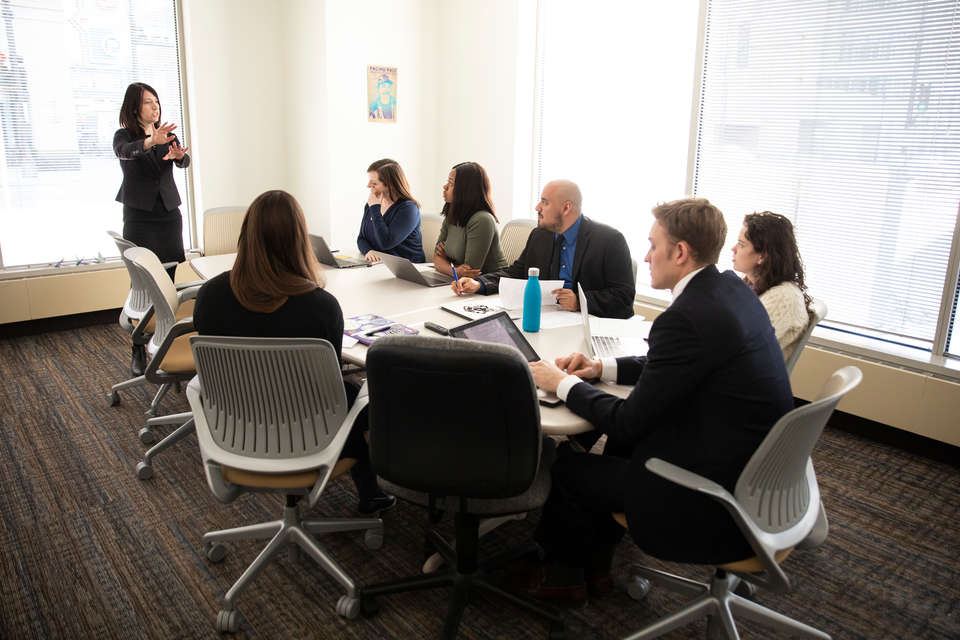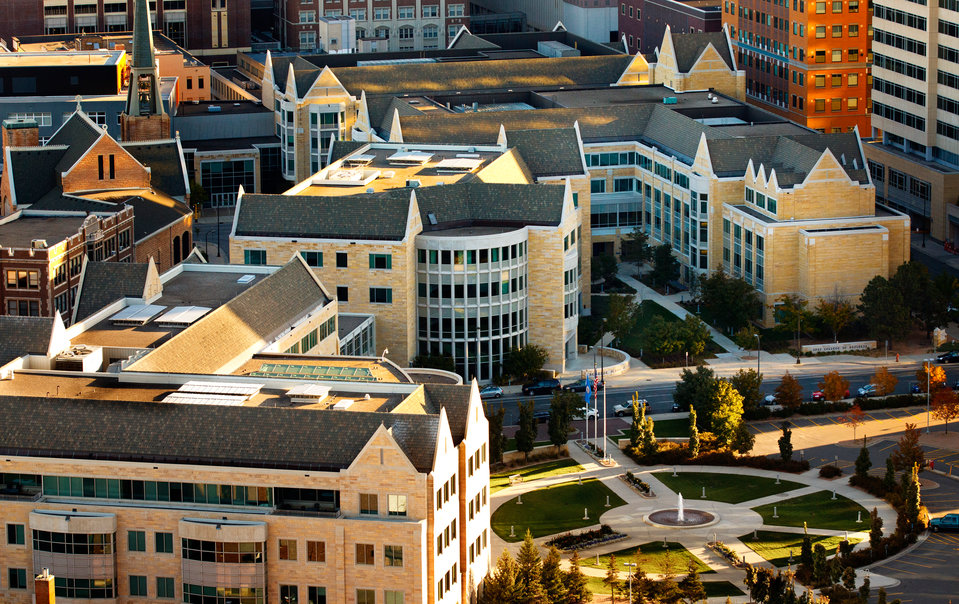The Criminal and Juvenile Defense Clinic, started just two years ago at the School of Law, has represented more than 50 clients in 10 counties. The clinic provides free legal representation to those who can’t afford it – to “fill gaps in Minnesota’s legal system,” according to its founder Assistant Professor Rachel Moran.
The clinic handles a variety of cases, from petty, regular and gross misdemeanors to, occasionally, felonies. Client cases, while varying by semester, are on average 60% juvenile cases and 40% adult cases. Following the death of George Floyd, the clinic began offering to represent individuals charged with petty offenses, misdemeanors, gross misdemeanors and juvenile delinquency in connection with the protests.
Judges who have worked with the clinic come away impressed.
“The student-attorneys are always very well prepared, quite poised, and they are zealous and effective advocates for their clients,” said 4th Judicial District Judge Mark Kappelhoff, who has seen firsthand the clinic’s impact in his court.
“In our criminal justice system, it is critically important that those who are accused of a criminal offense are provided effective counsel to represent their rights during the course of a criminal case,” he said. “By representing youth in juvenile court who may not have an attorney, the student-attorneys from the clinic are providing important legal services to these clients, which, in turn, helps to improve the juvenile justice system in Hennepin County.”
Hennepin County asked the clinic to represent teens charged with serious traffic offenses (reckless driving, leaving the scene of an accident, etc.) because public defenders are not assigned to civil cases. Before the clinic’s existence, most of the teens in those cases just went unrepresented. As a result of not having attorney representation, they pled guilty.
The clinic represents clients all the way through resolution of their cases, which could include a dismissal of the charges, a guilty plea or going to trial. The length of cases can range from just a couple of weeks to longer than a couple of semesters. The clinic also handles expungement cases.
“There is a huge need in Minnesota for people who have previously been charged and sometimes convicted, to have criminal charges on their record wiped away,” Moran said. “There is no free attorney provided [by the state] for people who are seeking to expunge those records. Criminal charges cause huge problems for people with housing, employment, schooling … in certain occupations – you’re automatically excluded from them if you have a certain type of conviction.”
The clinic currently is handling six expungement cases. One deals with a woman who committed a crime (“out of desperation associated with poverty,” according to Moran) many years ago.
“It has been a thorn in her side for years,” Moran said. “It has kept her from having stable housing; it has been the reason she’s been denied many, many jobs. She had numerous jobs where she had made it to the end of the process, told that she would get the job, but when (the employer) ran the background check, she was told, ‘Actually, no.’”
The woman, a mother of two young children, was worried about what this was doing to them. The law student team successfully had her case expunged last fall.
“She [the client] cried and was hugging the students outside the courtroom. It was pretty moving,” Moran said. “[In our profession] a lot of people go in thinking that they want to help folks, but sometimes that’s actually hard to achieve. When you see it happen right in front of you, it’s so rewarding and even overwhelming.”

Student Eduardo Salgado Diaz conducts a mock witness examination during a class session at the Interprofessional Center for Counseling and Legal Services in Opus Hall in Minneapolis.
To the Minnesota Supreme Court
One post-conviction case handled by the clinic is with the Minnesota Supreme Court (as of when this article went to press). The clinic took on the case, which involves an incarcerated man, at the district court level.
Joseph Cavello 3L is one of the students working on the case. “This was one of the most transformative cases [for me] because I had worked in a prison ministry writing letters to more than 100 incarcerated individuals for a year, so I had developed relationships with men in prison before,” he said. “To actually go and visit our client in person was quite a new experience for me.”
At first, Cavello was nervous, because he had never visited a prison.
“It was really good to see what a nice individual he was. We had normal conversations about ordinary things,” Cavello said. “To be able to encounter someone who was in a position like his, to see that he had a story behind how he got to where he was, that having somebody listen to his story – give him an ear – and be a real friend to him, was powerful.”
Client-centered

Members of the St. Thomas School of Law’s Criminal Defense Clinic discuss cases during a class session at the Interprofessional Center for Counseling and Legal Services in Opus Hall in Minneapolis.
Pictured, from left: Aaron Bostrom, Katherine Boland and Dolapo Oshin
Moran called client-centeredness one of the key components of the clinic’s model of representation. “It’s not us coming in and deciding what is best for the client,” she said. “It’s us working with the clients to help them think through what they want to achieve in their case and then doing our best to achieve what the client has decided.”
Being a part of the clinic has opened the eyes of the student-attorneys to the realities of the legal system.
“We shouldn’t take people’s licenses away for not being able to pay minor traffic fines, which is the current state of the law,” said clinic participant Leyla Bari 3L.
“We’re against any imposition of fines on an indigent population, and people don’t realize what a serious issue that is,” Christopher Sharpe 2L added. “Just being in the clinic for a couple of months, we realized that imposition of fines on people who can’t pay them is a debilitating factor in the cycle of poverty.”
“[The justice system] is very difficult to navigate for some of our clients,” Cavello said. “It’s not an easy system to navigate whether you’re guilty or innocent – it doesn’t matter. It’s really powerful for these clients to have somebody who goes in and fights for them and advocates for them; it’s hard enough even for someone studying law to navigate it.”
Reaching Homeless and Vulnerable Populations
Moran and her student-attorneys have taken many steps to reach more people who could benefit from the clinic. For instance, in partnership with the Minneapolis Police Department Homeless and Vulnerable Population Initiative, student-attorneys have ridden along with officers. They also meet with people at a coffee shop, The Hub, operated by a church just south of downtown Minneapolis. In addition, Moran and her student-attorneys participated in Hennepin County’s first Juvenile Warrant Forgiveness Day and Community Resource Fair last fall.
Beyond helping clients, the clinic may be inspiring future attorneys. “We have had a couple of teenage clients who have said at the end, ‘I want to be a lawyer now,’” Moran said. “That’s really cool. I love that! I love that they connected enough with our students that they saw some reason for inspiration or motivation.”
She also wants to build the reputation of the clinic as one that provides effective, zealous representation for its clients. Eventually, Moran wants to see enough graduates go through the clinic that the way people practice criminal defense is changed.





